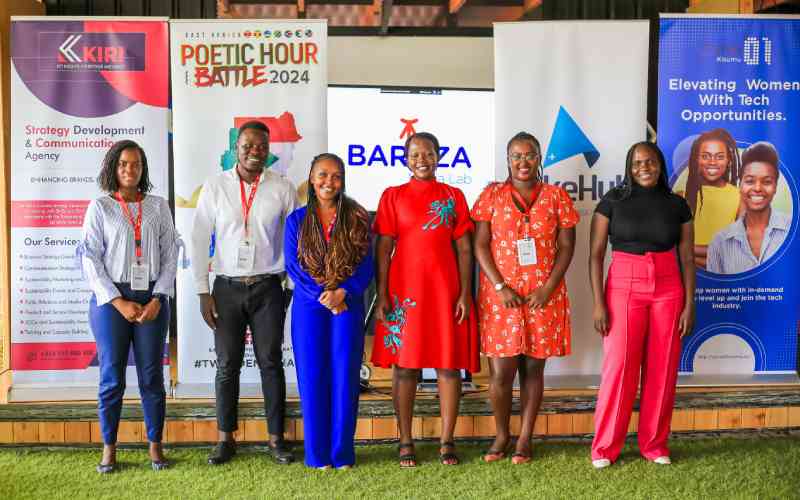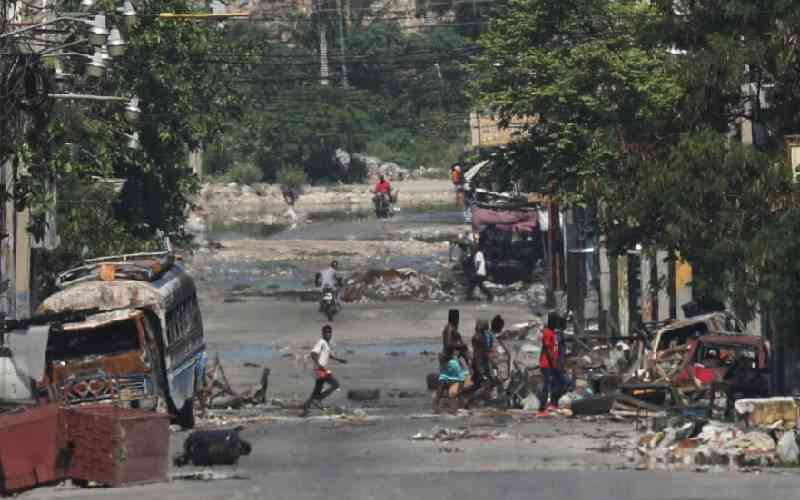 |
|
Clifton Gachagua. [PHOTO: COURTESY] |
By EVAN MWANGI
The award-winning collection of poetry by Clifton Gachagua, Madman at Kilifi, is out and will be in Nairobi bookshops from any time now. Published in the US by the University of Nebraska Press, Gachagua’s poetry might disappoint because it lacks the overt political statements we find in some of Okot p’Bitek’s works.
But the younger poet is dealing with a different kind of politics, located in a 21st-century cosmopolitan ethic. He avoids seeing things from a tribal prism as he occupies a space of self-enunciation that is distinctly urbane.
His work is sensual but it does not degenerate into the commercial pornography of the 1970s, written by creepy self-promoters without an idea what basic decency constitutes.
Constant relocation energises Gachagua’s poetry. It is full of images of mobility and border crossing. “Like most people who grew up in Eastlands, my family moved a lot,” says Gachagua in an interview. “Even when we were not moving from Dandora to Kariobangi South, we were moving houses within the same flat.”
Gachagua, who we have met before in the sixth edition of the Kwani? journal, was born and brought up in Eastlands in Nairobi and studied Biomedical Science and Technology at Maseno University between 2007 and 2011. Since last year, the 1987-born artist has been an editorial assistant at Kwani and a scriptwriter at both Spielworks Media and Well Told Story.
His publication will be distributed in East Africa by Kwani Trust, whose managing editor, Billy Kahora, says they are expecting the book to arrive soon.
The Dagoretti High School alumnus reveals that his hobbies include bird watching and “long walks to nowhere.” He was in Zimbabwe when we last talked to him.
“I love taking a bus to another town. On weekends I’m mostly locked in my room reading and writing and drinking whiskey,” he says.
Gachagua has trekked a long way before seeing his poetry in book form. “I started trying to write poetry for a big audience as a university student,” he says. “My friends and I would walk around sticking up pamphlets with poetry, opinions, flash fiction on notice boards. A lot of people were interested in the kind of content we were creating.”
The poet is part of large team of young Kenyan writers working long hours to make things happen. He is in the Jalada collective, a group that brings together such energetic writers as Nickolas Ochiel, Jacky Ndinda, Okwiri Oduor, Mehul Gohil, and Moses Kilolo. “We are trying to come up with some exciting new writing,” says Clif (that being what Gachagua’s friends call him).
Among new writers in Kenya, Clif admires the works of Binyavanga Wainaina, Ngwatilo Mawiyoo, Keguro Macharia, and Shailja Patel. “Yvonne Owuor is teaching me a lot about narrative. I love her new novel, Dust. It’s the best thing I’ve read in a while.”
I ventured to ask him why a young Kayole poet brought up in Kariobangi South and Dandora, among other places in eastern Nairobi, is trying so hard to avoid Sheng in his poetry, in spite of some references to hip-hop.
Surely, avoiding Sheng alone won’t secure the book a place in Kenyan schools, as the poet uses the f-word a little too often. We also find in one of the poems a gay man reciting Ngugi wa Thiong’o from memory, probably (and this is my assumption) mistaking the “colon” in Decolonising the Mind for the colon in an artist’s posterior, from which (in the poem) marigolds sprout.
“I’m always listening to the sound structures of what I write, and this informs the language, and even words within a language, that I use,” he explains. “I’ve seen what poets who write in Sheng can do with their voice and craft. I don’t think I have that. So I write in a text and language that allows me to surprise myself.”
Stay informed. Subscribe to our newsletter
A talented artist, Gachagua has written scripts for a few television dramas like Block D, Sumu la Penzi (Swahili for “poisonous love”), and Jane and Abel. Most of his episodes are about the Nairobi life. His ambition is to write movie scripts.
Madman at Kilifi won the inaugural Sillerman First Book Prize for African Poets in 2013 and got published a few weeks ago alongside The Promise of Hope, a collection of new and selected poems by Kofi Awoonor, the Ghanaian writer who was killed in the Westgate terrorist attack last September.
The prize that Gachagua’s book won is awarded to African poets who have not previously published a book-length collection. The prize includes a $1000 (Sh 85,000) cash award and publication with the University of Nebraska Press in the US and Amalion Publishing in Senegal.
“There is a distinctive voice here,” said one of the judges about the manuscript. “This is a difficult trait to define, but when it emerges as it does here, it is striking for its originality. There is a fresh and adventurous intelligence and delight in Gachagua’s poems. The judges are all thrilled with this manuscript and we are expecting great things from Clifton Gachagua.”
It is poetry like Gachagua’s that give us hope in very bleak times. Despite the death of foundational African writers like Awoonor and Chinua Achebe, young writers continue to immortalise African with poems that instruct and inspire.
“I’m glad more and more people are writing and publishing. You can make a career as a writer,” he says. “Kenyans are also buying books, and that’s a really great thing.”
Gachagua is a young poet with a mature vision and an excellent command of language. His poems explore a range of themes: intercultural influences, electronic self-fashioning, ambivalent sexual desires, and the politics of the body.
“But the most important thing is to always write —and write what you want,” he says.
He urges young Kenyans, especially those who aspire to be writers, to read—and read some more. To him, reading will help the aspiring writers to position themselves after studying the current trends in the arts.
His influences are many and varying, “from the very old Japanese haiku poets to surrealists,” he says.
The list of writers he has read in the recent past is impressive. They range from Kwame Dawes to South African Gabeba Baderoon, and the Zimbabwean Charles Mungoshi to the Briton Mina Loy and the Americans John Ashbery, Alen Ginsberg, Robert Duncan, and Gertrude Stein.
However, he does not imitate his mentors and progenitors; he re-purposes them to talk about experiences that are particularly his.
As Kwame Dawes, the celebrated Ghanaian professor, poet, actor, editor, critic, and musician, notes in a foreword to Gachagua’s Madman at Kilifi, even though you can feel that Gachagua has “read his fill of Shakespeare, Eliot, and Ginsberg, one has the sense that he is not shackled by them but is willing to bend them to his purposes.”
In one of the self-reflexive poems, an artist wants to borrow an expression that he hears a partner in bed use and which he finds novel (“pound of flesh”) to use in a poem, only for the partner to confess that the expression is stolen from Shakespeare.
Gachagua is not writing back to anybody. He does not cannibalise other people’s gems. He is only expressing himself the best way he knows how.
The scatological description of latrine flies and the process of emptying one’s bowels in a slum toilet both expresses the macabre life among the poor and their struggle to survive in a tough environment. Gachagua documents our daily battles with a disarming gentle humour. You don’t want to be the one to cast the first stone, even if you find some of the descriptions a bit too dirty.
The book uses the f-word far too often for a strict Christian like me to be thrilled by some of the poems. But Gachagua’s references to posterior and frontal body orifices signify that modern Kenya is a postmodern space of strategic sexual ambivalences. He does not refer to sex and bodily effluents to undermine those in powerful offices as Achille Mbembe observes to be the case with artists who make lewd references. Uttering the f-word a million times won’t change anything in Africa.
Though an admirer of protest poets like the South African Dennis Brutus, Gachagua is not protesting in his poetry; his subjects are just signaling us towards body openings and folds (to borrow from Jacques Lacan) where pleasure is most intensely registered.
One of the poems, mocking a Zizek scholar, rejects the way academics fetishize violence and death from the loftiness of the ivory towers.
Yet the poems are full of references to death. But these are deaths that happen in far-off places, as captured in media images. The deaths serve only as metaphors for forms of denied intimacy.
Gachagua’s poems are the strongest statement I’ve listened to in the recent few years affirming the triumphs of life and possibilities of pleasure in a battered continent. He writes with uplifting maturity, sensitivity, and verve. He says he writes his poetry as a form of therapy. “Writing poetry in a way has been about finding a way to live and sustain my life,” he says. “I’d say it continues to save my life every day.”
To him, poetry is a way of comprehending the complexities of life and its ambiguities. “There are certain ways language can make life’s obscurities, pains, and incoherence map-able,” he says. “That’s always what I’m after.”
While earlier generations of African writers responded mainly to European colonialism, Gachagua is writing in the context of transnational friendships and influences.
 The Standard Group Plc is a
multi-media organization with investments in media platforms spanning newspaper
print operations, television, radio broadcasting, digital and online services. The
Standard Group is recognized as a leading multi-media house in Kenya with a key
influence in matters of national and international interest.
The Standard Group Plc is a
multi-media organization with investments in media platforms spanning newspaper
print operations, television, radio broadcasting, digital and online services. The
Standard Group is recognized as a leading multi-media house in Kenya with a key
influence in matters of national and international interest.
 The Standard Group Plc is a
multi-media organization with investments in media platforms spanning newspaper
print operations, television, radio broadcasting, digital and online services. The
Standard Group is recognized as a leading multi-media house in Kenya with a key
influence in matters of national and international interest.
The Standard Group Plc is a
multi-media organization with investments in media platforms spanning newspaper
print operations, television, radio broadcasting, digital and online services. The
Standard Group is recognized as a leading multi-media house in Kenya with a key
influence in matters of national and international interest.







